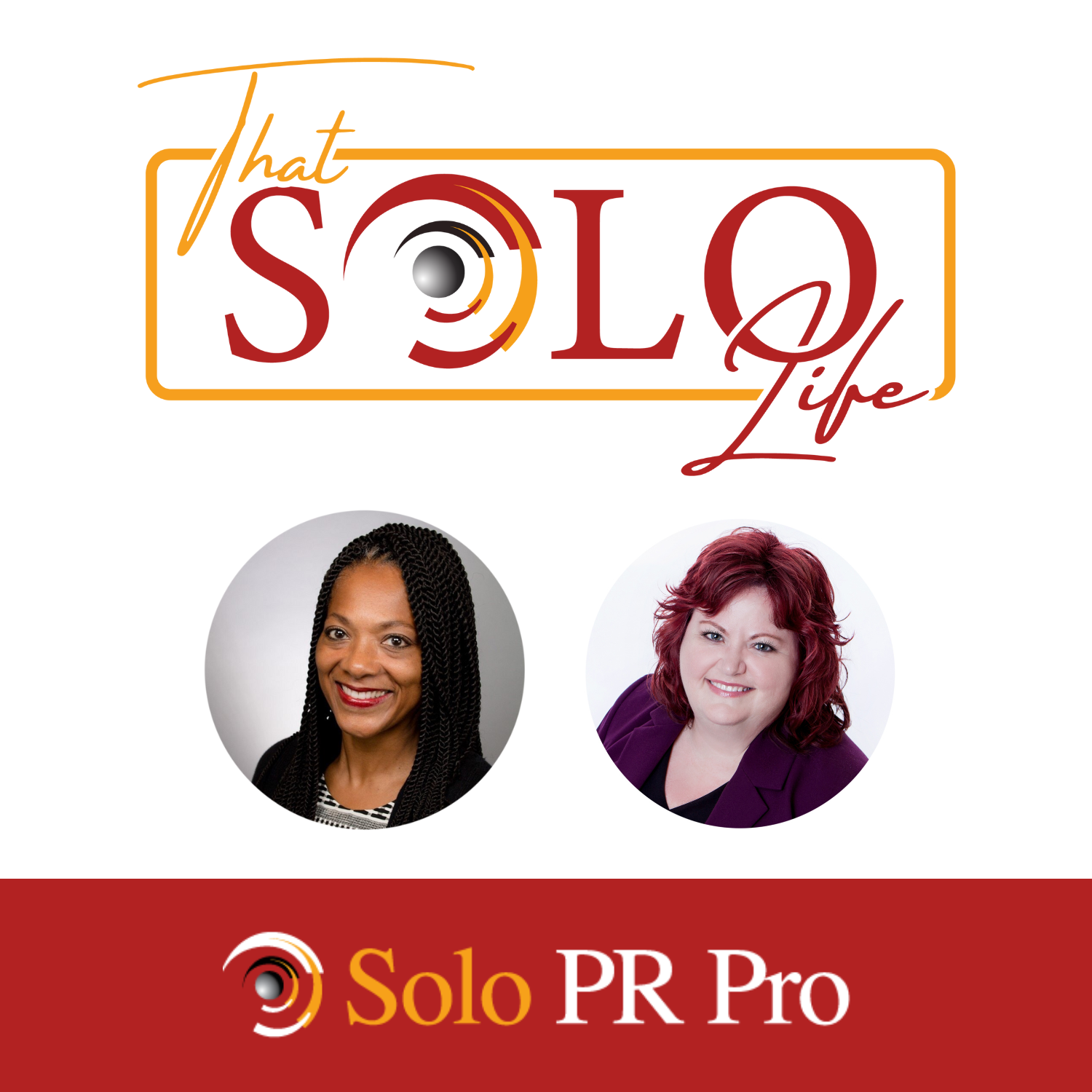
31.2K
Downloads
332
Episodes
That Solo Life: Co-hosted by Karen Swim, founder of Words for Hire, LLC and owner of Solo PR Pro and Michelle Kane, founder of VoiceMatters, LLC, we keep it real and talk about the topics that affect solo business owners in PR and Marketing and beyond. Learn more about Solo PR Pro: www.SoloPRPro.com
That Solo Life: Co-hosted by Karen Swim, founder of Words for Hire, LLC and owner of Solo PR Pro and Michelle Kane, founder of VoiceMatters, LLC, we keep it real and talk about the topics that affect solo business owners in PR and Marketing and beyond. Learn more about Solo PR Pro: www.SoloPRPro.com
Episodes
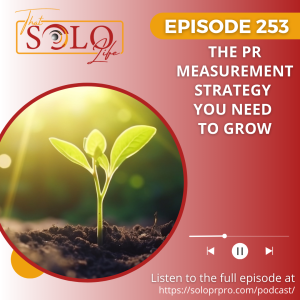
Monday Jun 10, 2024
The PR Measurement Strategy You Need to Grow
Monday Jun 10, 2024
Monday Jun 10, 2024
That Solo Life, Episode 253: The PR Measurement Strategy You Need to Grow
In this Episode
In this episode of "That Solo Life," co-hosts Michelle Kane and Karen Swim discuss another side of measurement in the PR industry. While measurement discussions typically focus on client work, Karen and Michelle talk about the importance of tracking tactics and metrics within your own Solo PR Pro business.
Karen emphasizes the tendency of PR professionals to prioritize client success over their own business metrics. She stresses the importance of tracking financial metrics to identify the most profitable clients and types of work. The discussion shifts to the need for measuring time spent on tasks to determine efficiency and profitability accurately.
The hosts discuss the pitfalls of focusing on the wrong metrics, referencing a study on B2B marketers who invested in the wrong areas due to misaligned measurements. They stress the importance of creating a sense of community and fostering word-of-mouth referrals for business growth. Michelle and Karen underscore the need for PR professionals to measure their efforts in writing, pitching, and media relations to enhance skill sets and improve success rates.
The episode concludes with a call to action for listeners to incorporate regular measurement practices into their solo PR businesses.
Episode Timeline:
- 00:01:10 - Importance of Measuring Tactics in Business
- 00:02:51 - Tracking Financial Metrics and Time Allocation
- 00:04:30 - Importance of Measuring for Mastery
- 00:05:26 - Focusing on the Right Metrics for Growth
- 00:07:27 - Creating Community and Word of Mouth
- 00:08:26 - Importance of Regular Measurement Practices
- 00:09:03 - Improving Success Rate and Time Management
- 00:10:36 - Pledging to Incorporate Measurement Practices
- 00:11:19 - Encouragement for Listener Engagement
Resources:
- RescueTime: The Most Productive Part of the Day
- Sword and the Script: Pair of surveys show why B2B tech needs to work on their customer marketing efforts
Enjoyed the episode?
Please leave a review here - even a sentence helps. Share and tag us (@SoloPR, @SoloPRPro) on social media so that we can thank you personally! Your support helps us keep bringing you insightful content every week. Thank you for tuning in!
Looking for more insights and support for your solo PR biz? Head over to Solo PR Pro and become part of our community. Don't forget to sign up for our newsletter for the latest tips and trends.

Wednesday Jun 05, 2024
Happy Everything, What We Get Wrong About Holiday Messaging
Wednesday Jun 05, 2024
Wednesday Jun 05, 2024
That Solo Life, Episode 252: Happy Everything, What We Get Wrong About Holiday Messaging
In this Episode
In this episode of "That Solo Life," co-hosts Karen Swim and Michelle Kane reflect on Memorial Day and discuss the importance of thoughtful messaging around holidays. Michelle and Karen discuss the post-Memorial Day weekend vibes and the common trend of using "happy" in front of every holiday, including somber ones like Memorial Day.
The hosts discuss the need for more conscientious messaging, honoring the historical context of holidays. Karen and Michelle reflect on the role of PR professionals in preserving the spirit of important holidays and their role in protecting the essence of celebrations beyond commercialization. They reflect on how holidays like St. Patrick's Day and Cinco de Mayo have been reduced to mere drinking festivities, losing sight of their cultural significance.
This episode serves as a poignant reminder to PR professionals and marketers to approach holiday messaging with sensitivity, respect, and a deeper understanding of the historical and cultural significance behind each celebration. Through their insightful discussion, Michelle and Karen underscore the importance of upholding traditions and honoring the true meaning of holidays in our communications.
Episode Timeline:
00:00:00 - Introduction and Discussion on Memorial Day Messaging
00:05:30 - Importance of Honoring Fallen Soldiers
00:08:06 - Examples of Proper Memorial Day Messaging
00:09:20 - Call to Action for PR Professionals to Protect Holiday Celebrations
00:10:45 - Discussion on St. Patrick's Day and Cinco de Mayo Traditions
00:11:18 - Reminder for Considerate Fourth of July Celebrations
Enjoyed the episode?
Please leave a review here - even a sentence helps. Share and tag us (@SoloPR, @SoloPRPro) on social media so that we can thank you personally! Your support helps us keep bringing you insightful content every week. Thank you for tuning in!
Looking for more insights and support for your solo PR biz? Head over to Solo PR Pro and become part of our community. Don't forget to sign up for our newsletter for the latest tips and trends.
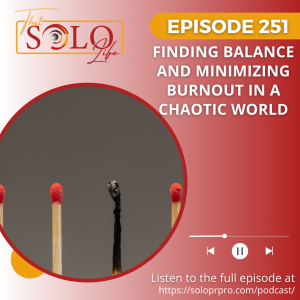
Monday May 27, 2024
Finding Balance And Minimizing Burnout In A Chaotic World
Monday May 27, 2024
Monday May 27, 2024
That Solo Life, Episode 251: Finding Balance And Minimizing Burnout In A Chaotic World
In this Episode
In this episode of "That Solo Life," co-hosts Karen Swim, APR and Michelle Kane delve into the topic of navigating fatigue and finding balance in the midst of global stressors and personal challenges. This Mental Health Awareness Month episode kicks off with a discussion about the impact of external factors such as the pandemic, economic instability, and political tensions on individuals' energy levels and overall well-being.
Karen and Michelle reflect on the collective exhaustion felt by many in 2024, highlighting the ongoing effects of the pandemic and the relentless stream of stressors that continue to weigh on people. They emphasize the importance of recognizing and addressing burnout, citing articles that discuss how work environments can contribute to physical and mental health issues.
The conversation shifts to the changing landscape of work post-pandemic, with Karen and Michelle acknowledging the need for individuals to reassess their priorities and boundaries. They explore the challenges of returning to office work, the impact of technological advancements, and the importance of self-care practices in maintaining resilience.
Throughout the episode, Karen and Michelle offer practical tips for managing stress and prioritizing well-being. They emphasize the significance of self-care routines, healthy eating habits, and coping mechanisms such as deep breathing and mindfulness. The hosts encourage listeners to set boundaries, prioritize their mental and physical health, and recognize the value of saying no to commitments that do not align with their well-being.
As the episode concludes, Karen and Michelle underscore the importance of self-awareness and self-compassion in navigating the complexities of modern life. They challenge listeners to prioritize their own needs and to approach each day with a sense of balance and grace. The hosts invite feedback from the audience and share resources available on the Solo PR Pro website to support listeners in building their businesses and maintaining personal well-being.
Tune in to "That Solo Life" for insightful discussions, practical tips, and inspiring conversations on navigating the challenges of solo entrepreneurship and finding balance in a fast-paced world.
Episode Highlights:
00:01:19 - Global Fatigue and Burnout
00:04:01 - Shift in Work Dynamics
00:05:27 - Uncertainty and Event Attendance
00:09:48 - Frustrations with Corporate Expectations
00:10:09 - Self-Care and Well-being Practices
00:12:02 - Managing Energy and Reactions
00:13:09 - Embracing Grace and Understanding Sensitivities
00:16:05 - Setting Boundaries and Prioritizing Self-Care
00:17:05 - Finding Balance and Self-Awareness
00:18:09 - Encouragement to Prioritize Self-Care and Share the Podcast
Resources:
- National Institute of Mental Health - Support and Resources
- 988 Suicide & Crisis Lifeline - Online Chat
- Job burnout: How to spot it and take action
- Work Burnout: How It Affects Your Mental Health
Enjoyed the episode?
Please leave a review here - even a sentence helps. Share and tag us (@SoloPR, @SoloPRPro) on social media so that we can thank you personally! Your support helps us keep bringing you insightful content every week. Thank you for tuning in!
Looking for more insights and support for your solo PR biz? Head over to Solo PR Pro and become part of our community. Don't forget to sign up for our newsletter for the latest tips and trends.
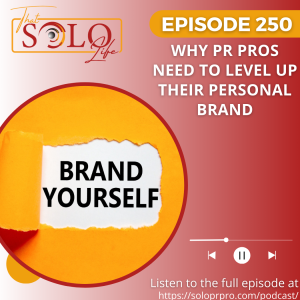
Monday May 20, 2024
Why PR Pros Need to Level Up Their Personal Brand
Monday May 20, 2024
Monday May 20, 2024
Welcome to another episode of That Solo Life, where we dive into the world of PR and marketing for independent professionals. In this episode, we discuss the power of personal branding in the PR industry.
Publicists have recently been in the spotlight, from the Oscars to various articles highlighting their work. This recognition serves as a reminder for solo PR professionals like us to also focus on promoting ourselves, not just our clients.
Karen and Michelle delve into the importance of personal branding and how it can impact our businesses. While some may feel uncomfortable with self-promotion, they emphasize the need to market your skills and expertise in order to attract clients and stand out in a competitive industry.
The discussion offers practical tips for building a personal brand, from updating headshots to engaging on platforms like LinkedIn. We stress the value of sharing our knowledge and experiences, whether through writing articles, speaking engagements, or social media posts.
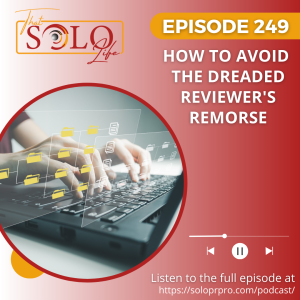
Monday May 13, 2024
How to Avoid the Dreaded Reviewer's Remorse
Monday May 13, 2024
Monday May 13, 2024
That Solo Life, Episode 249: How to Avoid the Dreaded Reviewer's Remorse
In this Episode
In this episode of "That Solo Life," Karen and Michelle dive into the common struggle of "reviewer's remorse" that many PR pros, marketers, and communicators face when working with clients. They discuss the frustration of finalizing a project, only to have last-minute changes or new reviewers throw a wrench into the process.
They emphasize the importance of establishing a clear review process with clients, setting expectations early on, and limiting the number of reviewers to essential personnel. They also highlight the significance of trust between the client and the solo PR professional, ensuring that the end goal and messaging align seamlessly.
Throughout the episode, the hosts stress the need for open communication, patience, and understanding when dealing with clients experiencing reviewer's remorse. Karen and Michelle discuss the need to provide practical tips, such as creating a document workflow process, setting clear review criteria, and allowing sufficient time for discussion and revisions.
With personal anecdotes and insights, the episode aims to help fellow solo professionals streamline their review processes, minimize last-minute changes, and build stronger relationships with their clients. Tune in and let’s navigate the complexities of client feedback and strive to deliver the best possible outcomes in our solo careers.
Episode Highlights:
00:01:19 - Reviewers' Remorse Discussion
00:04:09 - Minimizing Reviewers' Remorse Occurrence
00:07:04 - Digging for Core Issues
00:10:27 - Importance of Trust in the Review Process
00:11:29 - Considerations for Printed Pieces
00:11:52 - Limiting Number of Reviewers
00:13:18 - Streamlining Feedback and Input
Enjoyed the episode?
Please leave a review here - even a sentence helps. Share and tag us (@SoloPR, @SoloPRPro) on social media so that we can thank you personally! Your support helps us keep bringing you insightful content every week. Thank you for tuning in!
Looking for more insights and support for your solo PR biz? Head over to Solo PR Pro and become part of our community. Don't forget to sign up for our newsletter for the latest tips and trends.
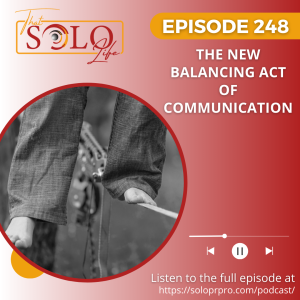
Monday May 06, 2024
The New Balancing Act of Communication
Monday May 06, 2024
Monday May 06, 2024
That Solo Life: Episode 248
The New Balancing Act of Communication
In this Episode
It’s a balancing act! Karen Swim, APR, of Solo PR, and Michelle Kane, of Voice Matters dive into the challenging topic of addressing current social and political conflicts in the workplace. The episode opens with a discussion about the ongoing Israeli-Gaza conflict and the protests happening across the United States, setting the stage for a conversation on how communication professionals can guide their clients through navigating these complex issues.
The conversation also touches on the evolving role of public relations professionals in shaping conversations and promoting sanity in communication. Throughout the episode, we highlight the importance of maintaining open dialogue, fostering mutual respect, and creating safe spaces for discussions on contentious issues.
As you listen, we hope that you will gain valuable insights and practical advice to help you face the complexities of addressing social and political conflicts in today's world.
Episode Highlights:
- 00:01:05 - Addressing Current Conflicts : Discussion of the Israeli-Gaza conflict and protests in the United States.
- 00:02:33 - Navigating Conversations in the Workplace : What PR Pros can do to guide clients through addressing conflicts in the workplace.
- 00:05:19 - Misinterpretation of Company Statements : Discussion on how people interpret company statements and the need for clear communication.
- 00:08:48 - Importance of Context in Communication : The hosts emphasize the importance of context in communication and avoiding misinterpretations.
- 00:11:55 - Living Out Mission, Vision, and Values : Michelle and Karen stress the importance of companies aligning actions with their mission, vision, and values.
- 00:13:55 - Asserting Professional Counsel : The hosts encourage communication professionals to assert themselves and provide professional counsel in challenging situations.
Resources:
Enjoyed the episode?
Please leave a review here - even a sentence helps. Share and tag us (@SoloPR, @SoloPRPro) on social media so that we can thank you personally! Your support helps us keep bringing you insightful content every week. Thank you for tuning in!
Looking for more insights and support for your solo PR biz? Head over to Solo PR Pro and become part of our community. Don't forget to sign up for our newsletter for the latest tips and trends.

Monday Apr 29, 2024
Everything Old is New Again
Monday Apr 29, 2024
Monday Apr 29, 2024
That Solo Life: Episode 247
Everything Old is New Again
In this Episode
Karen Swim, APR, of Solo PR, and Michelle Kane, of Voice Matters delve into the importance of getting back to basics in our PR and marketing businesses.
Today’s conversation is sparked by an email from Peter Shankman, the founder of the original "Help a Reporter Out" platform, which was eventually sold to a large corporation. Shankman has now launched a new platform called "Help Every Reporter Out," and in his announcement he shared his “back to basics” inspiration and how it led him to return to something he was no longer doing.
As PR professionals, we often find ourselves constantly reinventing our workflows, tools, and client work in an effort to keep up with the ever-evolving industry. But new is not always better. Sometimes returning the old things can improve not only how we do our jobs but how we feel about them.
We delve into the topic of technology, staying true to our natural skill sets and passions in our careers, and how the basics include having a supportive community of fellow professionals.
Episode Highlights:
- [00:00:18] - Old but new. The value of getting back to basics and the importance of realigning and retooling.
- [00:02:09] - Be a hero. How Peter Shankman, Help Every Reporter Out inspired us to be a hero to ourselves by focusing on our areas of expertise.
- [00:05:04] - Reevaluating Tools and Subscriptions. All the shiny new tools hold so much promise and you can accumulate a pile of clutter.
- [00:09:35] - Recognizing Natural Skillsets. It is important to recognize and focus on your natural skillsets and passions in order to maintain satisfaction and success in a career.
- [00:10:29] - Scaling Back for Success. Karen and Michelle discuss the idea of scaling back team members or business models to maintain a manageable workload and find fulfillment in solo work.
Resources:
- Help Every Reporter Out (HERO) - free sign-up for PR Pros and Journalists
- Back to basics in your business model -From Solo PR to Agency and Back Again
Enjoyed the episode?
Please leave a review here - even a sentence helps. Share and tag us (@SoloPR, @SoloPRPro) on social media so that we can thank you personally! Your support helps us keep bringing you insightful content every week. Thank you for tuning in!
Looking for more insights and support for your solo PR biz? Head over to Solo PR Pro and become part of our community. Don't forget to sign up for our newsletter for the latest tips and trends.

Monday Apr 22, 2024
Ethical and Legal Challenges of the Modern PR Pro
Monday Apr 22, 2024
Monday Apr 22, 2024
That Solo Life: Episode 246
Ethical and Legal Challenges of the Modern PR Pro with Special Guest, Cayce Myers
New episodes every Monday
In this Episode
"That Solo Life" podcast hosts Karen Swim, APR and Michelle Kane sit down with Cayce Myers, Ph.D., LL.M., J.D., APR, an experienced public relations professional and author. In this episode, Myers discusses his latest book, "The Rules of Public Relations, Legal and Ethical Issues and Contemporary Practice," which tackles the intersection of public relations, law, and ethics.
Myers emphasizes the importance of understanding the legal implications of PR crises and the need for transparency when using artificial intelligence (AI) in PR. He stresses that PR professionals have a responsibility to navigate the challenges of disinformation and misinformation during election years. Brands are advised to align their communication strategies with their mission, vision, and values.
Throughout the episode, Myers draws from his extensive experience in the field to offer valuable insights into the ever-changing landscape of PR.
Whether you're a seasoned PR professional or just starting out in the industry, this episode is packed with practical advice and thought-provoking conversations about the legal and ethical challenges surrounding public relations. Don’t miss out on this fascinating discussion!
Cayce Myers, Ph.D., LL.M., J.D., APR
Cayce Myers is a professor of public relations and director of graduate studies at the School of Communication at Virginia, where he researches and teaches about the legal, regulatory, and ethical aspects of public relations. As a lawyer who also holds a Ph.D. in mass communication, Myers has authored five books and sixty publications including peer-reviewed articles, book chapters, law review articles, and trade press pieces, covering topics such as public relations history, strategy, political campaigns, and related laws and policies. His newest publication, "The Rules of Public Relations," delves into the current laws and ethical challenges in the field of PR practice. The release is scheduled for this July.
Episode Highlights:
- [01:58] Risk and reputation. Lawyers and communicators view crises through a different lens, but do not have to be in opposition.
- [06:37] Oh my AI. The murkiness of AI and what PR pros need to navigate this new technology.
- [11:27] I’ll just wait it out. PR Pros are reluctant to use AI, fearing it could create issues.
- [14:29] Embracing the future. The bright future of PR and what companies need to know when they hire younger workers.
- [18:56] The politics of it all. Elections, elections all over the globe and the impact on PR pros in 2024.
Resources:
- The Rules of Public Relations: Legal and Ethical Issues in Contemporary Practice (Publisher) (Use RLFANDF25 to save 25% off print book )
- The Rules of Public Relations: Legal and Ethical Issues in Contemporary Practice (Amazon)
Enjoyed the episode?
Please leave a review here - even a sentence helps. Share and tag us (@SoloPR, @SoloPRPro) on social media so that we can thank you personally! Your support helps us keep bringing you insightful content every week. Thank you for tuning in!
Looking for more insights and support for your solo PR biz? Head over to Solo PR Pro and become part of our community. Don't forget to sign up for our newsletter for the latest tips and trends.
Say Thanks to Cayce Myers!
If you liked this episode with Cayce Myers, please say thanks on LinkedIn and follow his author page on Amazon.
Listen to the episode on our website, Apple Podcasts, Spotify, Amazon Music, or on your favorite podcast platform. You can watch the interview on YouTube here.

Monday Apr 15, 2024
Language, Landmines And The Peril Now Facing PR Pros
Monday Apr 15, 2024
Monday Apr 15, 2024
That Solo Life, Episode 244: Language, Landmines And The Peril Now Facing PR Pros
That Solo Life, a podcast dedicated to PR professionals, marketers, and individuals who work for themselves.
In this episode hosts, Karen Swim of Solo PR Pro, and Michelle Kane from Voice Matters delve into the topic of avoiding generation gaps and cultural miscommunications.
In our discussion, we highlight how the emergence of a multigenerational workforce and multicultural society has made communication more complex. Together, we explore examples of misunderstood terminology, redefined norms, and quickly shifting cultural contexts. All of which could potentially influence the reception of our messages and client communications.
We also bring to the table the reality that not everyone has the same bank of references or base of knowledge. The universality of business references, iconic books, or even pop culture references is no longer a given. We navigate this landscape by encouraging PR professionals to provide context, or use universally understood language, thus facilitating clear and effective communication.
We also examine political influences, shedding light on how political parties or global events can assign new meanings to well-known terms, creating potential pitfalls for those unaware. We encourage communicators to be savvy, removing barriers, biases, and assumptions to truly connect with diverse audiences.
Closing the conversation, we impress upon our audience that everything communicates – the things we say and do (or don't do), often carry a message. PR professionals and communicators need to be involved in all sectors of an organization, as their insights could safeguard against reputation damage.
Episode Highlights:
- The modern communicator’s conundrum. We can never assume that words have a universal meaning. It is important to check everything.
- Multi-generations and the mix-ups that can happen.Each generation has shaped language in their own way. PR Pros have to be careful to ensure that they are saying what they mean to say across all generations.
- The predicament of politics. How politics has influenced the way we communicate.
- Why PR needs a seat at the table. Why PR should never be siloed in companies.
Call to Action:
Looking for more insights into the PR world? Head over to Solo PR Pro and become part of our community. Don't forget to sign up for our newsletter for the latest tips and trends.
---
Enjoyed the episode? Give us a rating and share the episode with a colleague. Your support helps us keep bringing you insightful content every week. Thank you for tuning in!

Monday Apr 08, 2024
What They Think We Do, What We Really Do And How To Bridge The Gap
Monday Apr 08, 2024
Monday Apr 08, 2024
That Solo Life, Episode 243: What They Think We Do, What We Really Do And How To Bridge The Gap
Welcome to the latest episode of "That Solo Life", the podcast passionately crafted for PR professionals by PR professionals. In this conversation, your hosts Michelle Kane and Karen Swim take you through the frustrations and challenges of people not understanding the role of public relations and the overlooked intricacies of articulating and demonstrating the value of public relations to clients and the public.
In this episode, you'll discover:
- The Perception Dilemma: Why the general public and even clients may have a skewed understanding of what public relations truly involves.
- Beyond Media Relations: How PR is much more than just press releases and media engagement; it's about vital strategic thinking and communication.
- Showcase Success: Why PR pros need to embrace measurement and demonstrating impact.
- Join the Conversation: An invitation to become a part of the growing Solo PR Pro community, where you'll find camaraderie and support from fellow professionals.
Key Takeaways:
- Recognizing the misunderstanding around the value of PR.
- Reflecting on the role of PR in shaping their own perceived value.
- Practical advice for PR pros to better communicate the wide array of services they offer.
- Effective strategies for PR pros to articulate their true value with confidence and clarity.
Rate, Review & Share!
If you found value in this episode, please rate and review our show, and share it with your networks.
Connect and Discuss:
Don't miss the opportunity to join the insightful discussions in the Solo PR Pro community. Connect with industry experts, exchange ideas, and get support from your colleagues.
